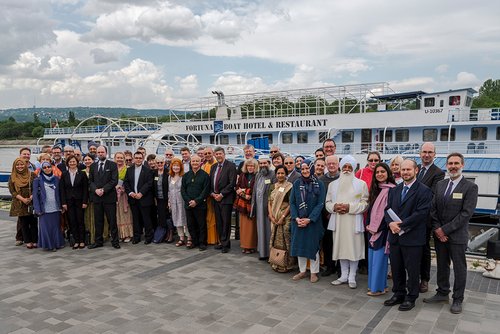Religious Leaders met in Budapest
2018. május 11., péntekEurope’s Religious Leaders call on communities to overcome prejudice and discrimination in a statement issued at their meeting in Budapest. On 7-8th May, 2018 the European Council of Religious Leaders (ECRL) came together in the beautiful and historic city of Budapest to explore the important theme of ‘Multi-religious Collaboration on Community Cohesion and Human Security’.
The ECRL meeting brought together senior religious leaders from Judaism, Christianity and Islam, Buddhism, Hinduism, Sikhism and Zoroastrianism. A symposium explored how religion might support and enhance efforts to break down negative stereotypes, create unanimity where deep division currently exists, and contributing to safe, peaceful and cohesive societies and communities in Europe today.
The changing political, social and demographic dynamics in contemporary Europe present some of the biggest challenges for a generation to European citizens, communities and governments. As the most representative body of religious leaders in Europe the ECRL issued a common statement, calling on communities, religious and political leaders across Europe.

The European Council of Religious Leaders (ECRL) brings together senior religious leaders from Europe’s historical religions: Judaism, Christianity and Islam together with Buddhists, Hindus, Sikhs and Zoroastrians. ECRL is one of five regional Interreligious Councils within the Religions for Peace global network. Religions for Peace – accredited to the United Nations – is the world’s largest and most representative multi-religious coalition advancing common action for peace since 1970.
The Budapest Statement asks to “realise and recognise the humanity and dignity of every single individual regardless of their origin or background, and to work tirelessly together to overcome all forms of prejudice and discrimination”. “Fear, hatred and division are typically based on false negative stereotypes”, the statement continues.
“The overwhelming majority of religious people across Europe and the world strongly reject and condemn all forms of violence, persecution and hate speech”, the ECRL emphasizes. It is therefore necessary to “challenge negative popular and political discourse which confuses religious identity and human security”.
History clearly shows “that a society or politics based on fear can only lead to greater anxiety, communal tensions, and anguish”, the statement points out. “A society or religion that is afraid of change is one that cannot be secure and confident in its own identity.”
“As a Council drawn from diverse religious traditions and beliefs, our work as a multi-religious Council is based on the firm belief that the values, beliefs and hopes that bring us together are far greater and more powerful than the differences that distinguish us”, the statement closes.
Hungarian Church representatives were also present at the Symposium organized by ECRL on 8th May and in a panel discussion reflected on the multi-religious cooperation in Hungary. Beside Rabbi Dr. Tamás Róna, the Jesuite Monk Ulrich Kiss SJ, Zoltán Sulok, the President of the Organization of Muslims in Hungary and Mátyás Mérő, Vaishnava pastor, RCH was represented by its former Presiding Bishop, Rev. Dr. Gusztáv Bölcskei, Chair of the Faculty for Systematic Theology at the Reformed Theological University in Debrecen.
Read the full text of the Budapest Statement
via www.ecrl.eu
Contact us
Click here if you are interested in twinning.
Reformed Church in Hungary
Address: H-1146 Budapest, Abonyi utca 21.
PO Box: 1140 Budapest 70, Pf. 5
Email: oikumene@reformatus.hu
English, German and Korean language services in Budapest
Links
Recommended articles
-
Pastoral Letter in the Light of the Pandemic
Bishop Dr. István Szabó sent a pastoral letter of encouragement to the ministers serving in RCH’s congregations, expressing his gratitude for the persistence and creativity of the pastors.
-
RCH Joins in Pope's Call for Prayer
RCH published the call on congregations to join the initiative of Pope Francis, supported by ecumenical organisations, to unite in praying the Lord’s Prayer on Wednesday, 25 March, at noon.
-
English Speaking Worship Services Online
Each Sunday at 11 AM (CET) the St. Columba's Church of Scotland in Budapest, the international community of RCH invites you to join the worpship service on its facebook page.
-
Test of Humanity and Companionship
Reformatus.hu asked Dr. György Velkey, Director General of the Bethesda Children’s Hospital of RCH about the challenges of health care workers and ways of prevention against the pandemic.
-
All Church Events Suspended
In light of the coronavirus the Presidium of RCH requested congregations to suspend all church events with immediate effect. Beside restrictions, it calls for prayer, sobriety and responsibility.











